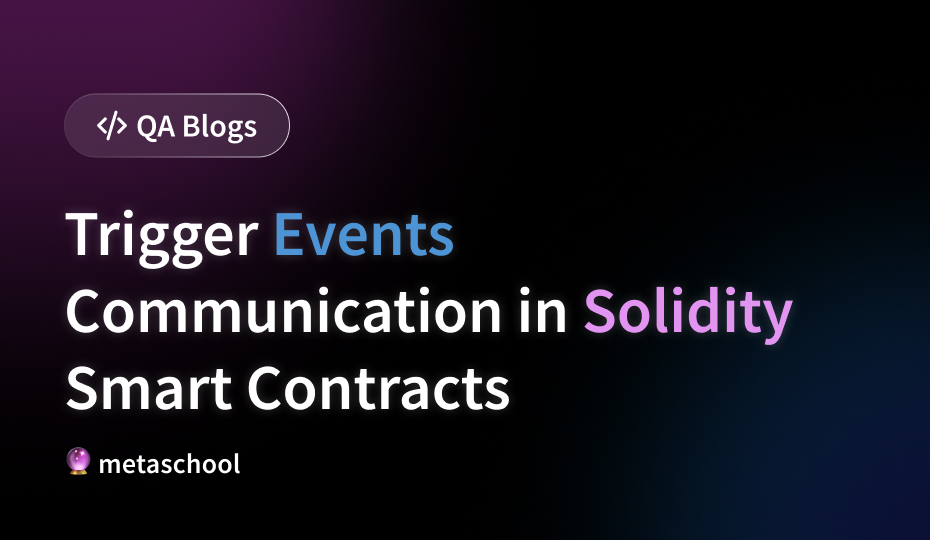Table of Contents
In the world of Solidity, smart contracts are like chatty neighbors on a blockchain block. They can’t directly barge into each other’s homes (modify variables), but they can shout announcements (emit events) to get everyone’s attention. These events are a powerful mechanism for contracts to communicate and trigger actions based on specific happenings within a contract. We will explore how to trigger events communication in Solidity.
Imagine This: You’re building a decentralized marketplace contract. When someone successfully buys an item, you want other parts of the system to be aware. Maybe you need to update a reputation system, notify the seller, or trigger a transfer of funds. This is where events come in – they act like a megaphone for your contract to broadcast important messages.
🔥 Check this course out: Create Your Own Ethereum Token in Just 30 Mins
Here’s How Events Work in Solidity
Defining the Event: The first step is to create an event definition within your contract. This definition specifies the kind of information you want to include in the announcement. Think of it like a pre-written message template. Here’s an example:
event ItemSold(address indexed seller, address indexed buyer, uint256 price); In this example, the ItemSold event captures three pieces of information:
seller: The address of the person who sold the item (indexed for efficient searching).
buyer: The address of the person who bought the item (indexed for efficient searching).
price: The price at which the item was sold.
Triggering the Event: Once you have the event defined, it’s time to decide when to broadcast the message. You’ll typically trigger the event within functions that perform important actions within your contract. Here’s how it might look in our marketplace example:
function buyItem(uint256 itemId) public payable {
// ... perform purchase logic (check price, transfer funds, etc.)
emit ItemSold(msg.sender, seller, price); // Announce the sale!
}In this code, the buyItem function handles the purchase logic. After completing the purchase, it emits the ItemSold event, providing details about the seller, buyer, and price.
Listening for the Event: Events are broadcasted on the blockchain, but they don’t magically appear for everyone to see. Other contracts (or even external applications) can choose to listen for specific events. This is similar to how you might tune into a particular radio station to hear their broadcasts.
Different ways to listen for events
Here’s the cool part: there are different ways to listen for events:
- On-chain Listening: Another Solidity contract can listen for events directly on the blockchain. This involves using the
event.watchfunction and providing a callback function that gets executed whenever the event is emitted. This allows for real-time interaction within the blockchain ecosystem. - Off-chain Listening: External applications (like web wallets or user interfaces) can also listen for events using tools like web3.js or other blockchain libraries. These tools can connect to a blockchain node and monitor for specific events. When an event of interest is detected, the application can take action, such as updating a user interface or triggering further operations.
Benefits of Event Triggering
- Decoupled Communication: Events provide a loose coupling between contracts. Listeners don’t need to know the internal workings of the contract emitting the event, just the data it provides. This promotes modularity and easier development.
- Transparency: Events are stored on the blockchain, providing a permanent record of what happened within a contract. This transparency is crucial for building trust in decentralized applications.
- Flexibility: You can define events for a wide range of situations, allowing for rich communication between contracts and external applications.
Example: Putting It All Together
Here’s a more complete example of event triggering in action:
- We have a
Marketplacecontract that manages item listings and purchases. - The
Marketplacecontract defines anItemSoldevent as described earlier. - When an item is bought, the
buyItemfunction successfully completes the purchase and emits theItemSoldevent. - A separate
Reputationcontract is listening forItemSoldevents from theMarketplacecontract. - Whenever an
ItemSoldevent is detected, theReputationcontract updates the seller’s reputation score based on the purchase price. - Additionally, a web application might be listening for
ItemSoldevents using web3.js. - When the web application detects an
ItemSoldevent, it can update its user interface to show the buyer a confirmation message and potentially notify the seller.
🔥 Check this course out: Build a One Piece Personality dApp With Solidity
Remember: Events are a Powerful Tool, But Use Wisely!
Events are a powerful tool for communication but use them wisely. Here are some additional points to consider:
- Event Filtering: When listening for events, you can filter them based on specific criteria. This helps avoid unnecessary processing and data overload. Imagine tuning into a specific radio program instead of listening to all broadcasts.
- Gas Costs: Emitting events involves writing data to the blockchain, which comes with a gas cost. Be mindful of how frequently you emit events and the amount of data you include.
- Security: Events themself are not inherently secure. If an event exposes sensitive information, it could be a privacy or security risk. Make sure only relevant data is included in your event definitions.
Conclusion: Trigger Events Communication in Solidity
Events are a cornerstone of communication in Solidity. They allow contracts to announce important happenings, triggering actions and updates across the blockchain ecosystem. By understanding how to define, trigger, and listen for events, you can build more interactive, transparent, and efficient decentralized applications. So, the next time you’re building a smart contract, remember the power of events – they’re the megaphone that keeps everyone on the same page in the exciting world of blockchain!
Follow us on –
🔮Twitter – https://twitter.com/0xmetaschool
🔗LinkedIn – https://www.linkedin.com/company/0xmetaschool/
